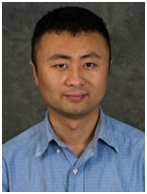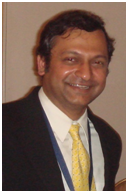

Welcome to the workshops for ICCCN 2015! The workshops at ICCCN represent cutting edge topics that provide an international forum for researchers to exchange and share their experiences, convey results on works in progress, and explore new ideas on hot and emerging topics in computer communications and networks. This year we enjoyed the fantastic privilege to have worked with researchers across the world in organizing five workshops covering a variety of topics. The workshops include:
ContextQoS: Workshop on Context-Aware QoS Provisioning and Management for Emerging Networks, Applications, and Services.
MobiPST: Workshop on Privacy, Security, and Trust in Mobile and Wireless Systems.
WiMAN: Workshop on Wireless Mesh and Ad-Hoc Networking.
MASONS: Workshop on Manageability and Security of Software Defined Network and Network Function Virtualization.
BDeHS: Workshop on Network Services and Applications: Big Data and e-Health.
We would like to make a special thanks to all of the workshop organizers for their leadership and hard work in putting together these excellent workshops. Organizing a workshop is a wonderful contribution to the research community and requires tremendous effort. We would also like to thank the workshop committee members and external reviewers for the time dedicated to reviewing the submitted papers. We are also grateful to the authors for submitting their work for consideration to the workshops. Many thanks are due to the ICCCN General Co-Chairs Prof. Min Song and Prof. Zhisheng Niu and the ICCCN Program Co-Chairs Dr. Aaron Striegel and Prof. Kewei Sha for their support and advising on numerous aspects of the workshop. Finally, we thank the Steering Committee Chair, Dr. E. K. Park, for his vision and dedication of maintaining ICCCN as a premier international conference.
Chair
- Willy (Wei) Liu, GGC School of Science & Technology, USA
Technical Program Committee
- Jason Cheng, Audaque, China
- Udo Krieger, University of Bamberg, Germany
- Jorg Liebeherr, University of Toronto, Canada
- Louis Liu, IBM, USA/China
- David Dai Wang, Audaque/LB, China
- Yang Wang, Intel Corporation, USA
- Eugine Zheng, Novartis, China/USA
- Shi-Sheng Zhu, Shantou University, China
Co-Chairs
- Dr.-Ing. Patrick-Benjamin Bök, Weidmüller Group, Germany
- Prof. Dr. Nader F. Mir, San Jose State University, USA
- Prof. Dr.-Ing. Dipl.-Wirtsch.-Ing. York Tüchelmann, Ruhr-University Bochum, Germany
Technical Program Committee
- PD Dr. Roland Bless, Karlsruhe Institute of Technology, Germany
- Dr.-Ing. Patrick-Benjamin Bök, Weidmüller Group, Germany
- Dr. Ranganai Chaparadza, IPv6Forum, Europe
- Rebecca Copeland, Telecom SudParis, France
- Dr. Björn Dusza, TU Dortmund University, Germany
- Ph.D. Pablo Alonso García, Vodafone, Spain
- Dr.-Ing. Andreas Hamburg, TÜV Rheinland, Germany
- Ph.D. Evangelia Kalyvianaki, Imperial College London, United Kingdom
- Katharina Siobhan Kohls, Ruhr-University Bochum, Germany
- Prof. Dr. Nader F. Mir, San Jose State University, USA
- Dr. Julius Müller, TU Berlin, Germany
- Prof. Dr. Andreas Noack, University of Applied Sciences Stralsund, Germany
- Prof. Jens Myrup Pedersen, Aalborg University, Denmark
- Dr. Tom Pfeifer, TU Berlin, Germany
- Sebastian Subik, Piciorgros, Germany
- Prof. Dr. Jörg Schwenk, Horst-Görtz Institute for IT-Security, Germany
- Andre Westhoff, DB Systel, Germany
- Prof. Dr. Christian Wietfeld, TU Dortmund University, Germany
- Dr. Parviz Yegani, Juniper Networks (CA), USA
Co-Chairs
- Abhishek Parakh, University of Nebraska at Omaha, USA
- Zhiwei Wang, Nanjing University of Posts & Telecommunications, China
Technical Program Committee
- Todd Andel, University of South Alabama
- Jeffrey McDonald, University of South Alabama
- Robin Gandhi, The University of Nebraska, Omaha
- Mauro Conti, University of Padua
- Claudio Agostino, Ardagna Universita’ degli Studi di Milano – Dipartimento di Tecnologie dell’Informazione
- Christoph Meinel, Hasso Plattner Institute Potsdam University
- Keke Chen, Wright State University
- Songqing Chen, George Mason University
- Gul Khan, Ryerson University
- Yafei Yang, Qualcomm Research
- Peng Zhang, Xi’an Jiaotong University
- Jiqiang Lu, Institute for Infocomm Research
- Dongwan Shin, New Mexico Tech
- Lukas Kencl, Czech Technical University in Prague
- Kai Zheng, IBM China Research Lab
- Eyuphan Bulut, Cisco Systems
- Wenjia Li, New York Institute of Technology
- Xiapu Luo, The Hong Kong Polytechnic University
- William Mahoney, University of Nebraska Omaha
- Long Vu, IBM T.J. Watson Research Center
- Yean-Fu Wen, National Taipei University
Chair
- Dr. Habib M. Ammari, University of Michigan-Dearborn, USA
Technical Program Committee
- Raffaele Bruno (IIT-CNR, Italy)
- Jiannong Cao (Hong Kong Polytechnic University, China)
- Xiuzhen Cheng (George Washington University)
- Abdelouahid Derhab (CERIST, Algeria)
- Gang Ding (Qualcomm Research)
- Karoly Farkas (Budapest University of Technology and Economics)
- Abdelmajid Khelil (TU Darmstadt, Germany)
- Jinhua Guo (University of Michigan-Dearborn, USA)
- Kamel Rahouma (Al-Qassim University, Saudi Arabia)
- Maria Elena Renda (IIT-CNR)
- Aaron Striegel (University of Notre Dame, USA)
- Shengquan Wang (University of Michigan-Dearborn)
- Wendong Xiao (I2R, Singapore)
Chairs
- Inder Monga, ESnet and LBNL, USA
- Amitava Biswas, Cisco Systems, USA
- Chen Liu, Microsoft, USA
Technical Program Committee
- Christian Rothenberg, University of Campinas, Brasil
- Gerhard Hasslinger, T-Systems ENPS Darmstadt
- Israat Haque, University of Alberta, Edmonton, Canada
- Josh Bailey, Google, USA
- Kenichi Ogaki, KDDI Corporation, Japan
- Laurent Lefevre, INRIA
- Lefteris Mamatas, University of Macedonia, Greece
- Lisandro Granville, Institute of Informatcis of the Federal University of Rio Grande do Sul (UFRGS), Brazil
- Michael Menth, University of Tübingen, Germany
- Rajat Mehrotra, Desert Research Institute, Reno, NV, USA
- Rajdeep Bhowmik, Cisco, USA
- Roberto Bruschi, DIST – University of Genoa
- Satya Mohanty, Cisco, USA
- Spyros Denazis, University of Patras, Greece
- Steven Latre, University of Antwerp, Belgium
- Xenofontas Dimitropoulos, University of Crete and FORTH
- Walter Cerroni, DEI – University of Bologna
Overview
| August 6 (Thursday) ICCCN 2015 Workshops | |||||
|---|---|---|---|---|---|
| 7:30 | Registration desk is open | ||||
| 8:00 – 10:00 | Session 1 | ContextQoS 1 Mesquite 5 |
MobiPST 1 Mesquite 4 |
MASONS 1 Mesquite 2 |
WiMAN 1 Mesquite 3 |
| 10:00 – 10:20 | Coffee break | ||||
| 10:20 – 12:20 | Session 2 | ContextQoS 2 Mesquite 5 |
MobiPST 2 Mesquite 4 |
MASONS 2 Mesquite 2 |
WiMAN 2 Mesquite 3 |
| 12:20 – 14:00 | Lunch | ||||
| 14:00 – 15:40 | MASONS 3 Mesquite 2 |
WiMAN 3 Mesquite 3 |
|||
| 15:40 – 16:00 | Coffee break | ||||
| 16:00 – 18:00 | MASONS 4 Mesquite 2 |
WiMAN 4 Mesquite 3 |
|||
Session 1: ContextQoS
Session Chair: Dr.-Ing. Patrick-Benjamin Bök, Weidmüller Group
Keynote: “Challenges for Industrial Internet”
Speaker: Dr.-Ing. Patrick-Benjamin Bök, Weidmüller Group
Abstract: The challenges of industrial internet are manifold, especially regarding the interconnection within and between production networks to perform some kind of advanced manufacturing. Context-aware approaches have to focus on the different parts of the industrial internet. Within machines, different components communicate with each other and exchange information to fulfill the production task. Within the production site, different machines will communicate with each other to exchange information and control the workflows of the production. Between production sites and, especially, between production, suppliers and distributors information will be exchanged to optimize the whole supply chain. In the future, this will not be the information at which point in time finished products will be available and delivered. Communication will begin at machine component level to have detailed information. This leads to a lot of challenges for the communication network because it will be a network of networks of networks of networks with heterogeneous technologies and protocols having varying performance requirements on the communication path between two entities. Furthermore, the security requirements of these networks are critical due to their contact to critical infrastructures, e. g. if advanced manufacturing is integrated into smart local grids. Based on scenarios having distributed production sites as a basis, the challenges of industrial internet are motivated.
Bio: Dr.-Ing. Patrick-Benjamin Bök received his B.Sc. (with honors) and his M.Sc. (with honors) at the Ruhr-University Bochum, Germany, both in Applied Computer Sciences, in 2006 and 2007, respectively. From 2007 to 2012 he was a research assistant and Ph.D. student at the Research Group for Integrated Information System in the Department of Electrical Engineering and Information Sciences at Ruhr-University Bochum, Germany, before he received his PhD (with honors). From 2012 to 2014 he was a senior scientist at the Communication Networks Institute (CNI) of the TU Dortmund University. At CNI, he was the head of “Highly Dynamic Networks, Wireless Robotics and Emergency Response Management” research group. He performed tutorials about technical improvements for computer networks and also about enterprise planning of computer networks. Today, he is Assistant to the CEO of Weidmüller Group.
Session1: MobiPST
Session Chair: Abhishek Parakh (University of Nebraska at Omaha)
Jay Yang (Rochester Institute of Technology), Roy Melton (Rochester Institute of Technology)
Session 1: MASONS
Session Chair: Amitava Biswas, Cisco Systems, USA
Keynote: “Security and the Software Defined Network”
Speaker: Phillip Porras, Program Director – Internet Security Group, SRI International
Abstract: Modern networks are undergoing an exciting transition toward a paradigm of greater programmability and dynamic flow management. For the network security community, this transformation is opening attractive opportunities for more innovative forms of threat mitigation. It is also raising interesting challenges in how to reconcile our legacy notions of well-defined security policy enforcement. I will discuss some of the ongoing work toward securing software-defined networks (SDNs), as well as some interesting new SDN-enabled security and management applications.
Bio: Phillip Porras is a Program Director, an SRI Fellow, and leader of SRI’s Internet Security Group in the Computer Science Laboratory at SRI International. Phillip is an established leader in live Internet malware analysis, with strong alliances with the whitehat community, and maintains ongoing collaborations with the top INFOSEC researchers in academia and the private sector. He has been a Principal Investigator for many research projects sponsored by DARPA, DoD, DHS, NSF, NSA, commercial customers, and others. Phillip has led multi-organizational large-scale projects with mixed academic and commercial collaborators, led many advanced research projects, and has been highly productive in acquiring government, military, and commercial projects involving Cyber Security R&D. He is an active researcher, publishing and conducting technology development in intrusion detection, alarm correlation, malware analysis, active networks, and wireless security. Previously, Phillip was a manager in the Trusted Computer Systems Department of the Aerospace Corporation, where he was also an experienced trusted product evaluator for NSA (which includes security testing, risk assessment, and penetration testing of systems and networks). He has participated on numerous program committees, and editorial boards, and on multiple commercial company technical advisory boards. Phillip’s research technologies have transitioned as lead products in multiple companies, holds fourteen U.S. patents involving INFOSEC technologies, and have been awarded Best Paper honors in 1995, 1999, and 2008.
Keynote: “Security Challenges and Opportunities in Network Function Virtualization”
Speaker: Dr. Ashutosh Dutta, Technology Executive (Mobility, Cloud and Enterprise Security) AT&T
Abstract: Software Defined Networking (SDN) and Network Function Virtualization (NFV) are becoming the key pillars of future network components that telecom operators and service providers can leverage in order to provide flexible and cost effective service without compromising the end user quality of service. While network function virtualization opens up the door for flexible service creation and rapid deployment, it offers both security opportunities and adds additional security challenges in some cases. These security issues can primarily be classified into several categories, namely OS security, network security, VM security, hypervisor-based security, API security, cloud security and NFV specific security. With the rapid deployment of 4G LTE networks, operators have started the trial deployment of network function virtualization, especially with various components for Evolved Packet Core (EPC), and IP Multimedia Services (IMS) such as, virtualized Residential Gateway, Virtualized Next Generation Firewalls, Virtualized Router, Virtualized Probes, and Virtualized Switch. However, very little attention has been given to the security aspects of virtualization by these vendors. While security expert group within ETSI NFV has started looking into many security issues introduced by Network Function Virtualization, additional work is needed with larger security community involvement. This talk will discuss various security challenges and opportunities introduced by virtualization, activities within the open source communities and will highlight a few deployment use case scenarios.
 Bio: Ashutosh Dutta is currently Lead Member of Technical Staff (LMTS) at AT&T’s Security and Mobility Organization within Chief Security Office where he leads the design and architecture of security for next generation mobility networks. His 25 years of career include CTO of Wireless at a Cyber security company NIKSUN, Senior Scientist in Telcordia Applied Research, Director of Central Research Facility at Columbia University, and Computer Engineer with TATA Motors. He has more than 80 conference and journal publications, three book chapters, 28 issued patents, and has given tutorials in mobility management at various conferences. Ashutosh’s research interests include wireless Internet, multimedia signaling, mobility management, 4G networks, IMS (IP Multimedia Subsystems), VoIP and session control protocols. Ashutosh is co-author of the book, titled, “Mobility Protocols and Handover Optimization: Design, Evaluation and Application”, published by John & Wiley. He serves as the editor-in-chief for the Journal of Cyber security and Mobility published by River Publishers. As a senior member of IEEE and ACM, Ashutosh served as the chair for IEEE Princeton / Central Jersey Section, Industry Relation Chair for Region 1 and MGA, Pre-University Coordinator for IEEE MGA and chair for Ad Hoc Committee for Public Visibility for ComSoc. As the vice chair of Education Society Chapter of PCJS, he co-founded the IEEE STEM conference (ISEC) in 2011 and helped to implement EPICS (Engineering Projects in Community Service) in the high schools within PCJS. Ashutosh currently serves as the director of Marketing and Industry Relations for IEEE ComSoc. He was recipient of the prestigious 2009 IEEE MGA Leadership award and 2010 IEEE-USA professional leadership award. Ashutosh obtained his BS in EE from NIT Rourkela, India, MS in Computer Science from NJIT and earned his M. Phil. and Ph.D. in Electrical Engineering from Columbia University, New York, under the supervision of Prof. Henning Schulzrinne.
Bio: Ashutosh Dutta is currently Lead Member of Technical Staff (LMTS) at AT&T’s Security and Mobility Organization within Chief Security Office where he leads the design and architecture of security for next generation mobility networks. His 25 years of career include CTO of Wireless at a Cyber security company NIKSUN, Senior Scientist in Telcordia Applied Research, Director of Central Research Facility at Columbia University, and Computer Engineer with TATA Motors. He has more than 80 conference and journal publications, three book chapters, 28 issued patents, and has given tutorials in mobility management at various conferences. Ashutosh’s research interests include wireless Internet, multimedia signaling, mobility management, 4G networks, IMS (IP Multimedia Subsystems), VoIP and session control protocols. Ashutosh is co-author of the book, titled, “Mobility Protocols and Handover Optimization: Design, Evaluation and Application”, published by John & Wiley. He serves as the editor-in-chief for the Journal of Cyber security and Mobility published by River Publishers. As a senior member of IEEE and ACM, Ashutosh served as the chair for IEEE Princeton / Central Jersey Section, Industry Relation Chair for Region 1 and MGA, Pre-University Coordinator for IEEE MGA and chair for Ad Hoc Committee for Public Visibility for ComSoc. As the vice chair of Education Society Chapter of PCJS, he co-founded the IEEE STEM conference (ISEC) in 2011 and helped to implement EPICS (Engineering Projects in Community Service) in the high schools within PCJS. Ashutosh currently serves as the director of Marketing and Industry Relations for IEEE ComSoc. He was recipient of the prestigious 2009 IEEE MGA Leadership award and 2010 IEEE-USA professional leadership award. Ashutosh obtained his BS in EE from NIT Rourkela, India, MS in Computer Science from NJIT and earned his M. Phil. and Ph.D. in Electrical Engineering from Columbia University, New York, under the supervision of Prof. Henning Schulzrinne.
Session 1: WiMAN
Session Chair: Habib M. Ammari, University of Michigan-Dearborn, USA
WiMAN Keynote: Taking VANET to the clouds
Speaker Prof. Stephan Olariu, Old Dominion University, USA
Abstract: Inspired by the success of conventional cloud services, a number of researchers have recently introduced the concept of a Vehicular Cloud (VC). In this keynote address, we envision a VC involving cars in the parking lot of a major airport. The patrons of such a parking lot are typically on travel for several days, providing a pool of cars that can serve as the basis for a data center at the airport. We anticipate a scenario where the cars that participate in the vehicular cloud are plugged into a standard power outlet and are provided wireless connection to a central server at the airport. The defining difference between vehicular and conventional clouds lie in the distributed ownership and, consequently, the unpredictable availability of computational resources. As cars enter and leave the parking lot, new computational resources become available while others depart creating a dynamic environment where the task of efficiently assigning cars to jobs becomes very challenging.
Bio: Professor Olariu has held many different roles and responsibilities as a member of numerous organizations and teams. Much of his experience has been with the design and implementation of robust protocols for wireless networks and in particular sensor networks and their applications. Professor Olariu is an Associate Editor-in-Chief of IEEE Transactions on Parallel and Distributed Systems and serves on the editorial board of IEEE Transactions on Computers, Networks, Journal of Parallel and Distributed Computing, Journal of Ad hoc and Sensor Networks, and Parallel, Emergent and Distributed Systems. Professor Olariu is applying mathematical modeling and analytical frameworks to the resolution of problems ranging from securing communications, to predicting the behavior of complex systems, to evaluating performance of wireless networks. His research interests are in the area of complex intelligent systems enabled by large-scale deployments of sensors and actors and more specifically in securing systems of systems.
Session 2: ContextQoS
Session 2: MobiPST
Session Chair: Zhiwei Wang (Nanjing University of Posts & Telecommunications)
Session 2: MASONS
Session Chair: Phillip Porras, Program Director – Internet Security Group, SRI International
Topic: Network Infrastructure & Network Performance
(DTU Fotonik – Networks Technology & Service Platforms Group)
Voith (Alcatel-Lucent Bell Labs), Volker Hilt (Alcatel-Lucent Bell Labs)
Session 2: WiMAN
Session Chair: Prof. Stephan Olariu, Old Dominion University, USA
Topic: Sleeping Techniques, Routing,and Diffusion
Session 3: MASONS
Session Chair: Deepak Bansal, Manager, Microsoft
Topic: Network Security
Session 3: WiMAN
Session Chair: Mike Wittie (Montana State University, USA)
Topic: Competition, Link Prediction, Energy Management and Secrecy
University), Guanglin Zhang (Donghua University), Lin Wang (Shanghai Jiao Tong University)
Session 4: MASONS
Session Chair: Inder Monga (Moderator), CTO, ESNet
Topic: Competition, Link Prediction, Energy Management, and Secrecy
Session 4: WiMAN
Session Chair: Habib M. Ammari, University of Michigan-Dearborn, USA
Topic: Architectures, Diffusion and Experiments


